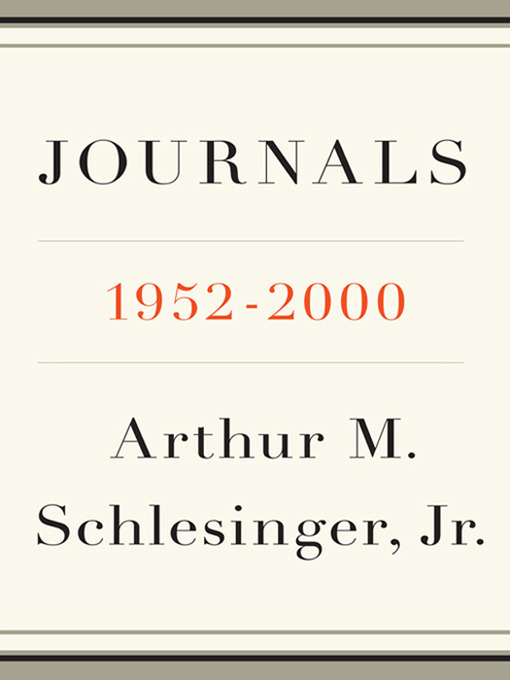
Journals
1952-2000
کتاب های مرتبط
- اطلاعات
- نقد و بررسی
- دیدگاه کاربران
نقد و بررسی

Starred review from December 31, 2007
Cultural and political commentator Schlesinger (1917–2007) formed his left-leaning worldview during FDR's New Deal; a liberal scholar and historian, Schlesinger produced more than 25 books (his last was 2005's War and the American Presidency
), won two Pulitzers and became a powerful force in shaping liberal political thought. Taking readers through Schlesinger's diaries year by year, the book begins with Schlesinger's first encounters with presidential candidate Adlai Stevenson, for whose (unsuccessful) campaign he would become a speech writer; fortunately, off years pass quickly (1953–1959 take up fewer than 30 pages), picking up again in 1960, when Schlesinger became special adviser to President Kennedy. With characteristic candor, Schlesinger weighs in on both: of Stevenson, “probably even more conservative than I had thoughtâ€; of JFK, “ has most of FDR's lesser qualities. Whether he has FDR's greater qualities is the problem for the future.†Subsequent years bring the expected: Vietnam and LBJ, the assassination of Robert Kennedy, Nixon and Watergate, the rise of Reagan and the fall of the Soviets, the first Gulf War and the second George Bush, all viewed through Schlesinger's singular perspective. Interspersed among an endless, engrossing parade of lunches with luminaries such as Henry Kissinger and Jacqueline Onassis, Schlesinger discusses his own work and a few personal details (“Another year; another house… spent most of the month getting settled at 118 East 82nd Street with my beloved Alexandraâ€). Most of the memoir, however, is a pleasingly understated whirlwind of big names and bigger issues. Rich in insight and cagily observed history, Schlesinger's weighty memoirs will mesmerize political junkies; even lay readers will be charmed and fascinated by Schlesinger's take on the 20th century's last half.

November 1, 2007
Schlesinger (1917-2007) was the preeminent liberal public intellectual of the post-World War II era: he authored 19 books, including Pulitzer Prize winners, and was regarded as the intellectual-in-chief of the Kennedy administration. His two sons Andrew "(Veritas: Harvard College and the American Experience)" and Stephen ("Act of Creation: The Founding of the United Nations") have superbly winnowed their father's 6000-page journal into a readable account of his life. Although most entries in the book are serious and lengthy reflections on presidencies and presidential campaigns, especially those of Adlai Stevenson, JFK, and Robert Kennedy, also included are such amusing details as the fact that Schlesinger disliked Jimmy Carter because he reminded him of Nixon and he was annoyed by "Rolling Stone" publisher Jan Wenner because he never picked up the lunch tab. Yet he hit it off with Mick Jagger when the rocker invited him and his wife to a party. Ultimately, Schlesinger's take on the last half of the 20th century will delight many, infuriate some, and inform all readers. Strongly recommended for all libraries.Karl Helicher, Upper Merion Twp. Lib., King of Prussia, PA
Copyright 2007 Library Journal, LLC Used with permission.

October 15, 2007
Advisor and speechwriter to Democratic Party presidential candidates from Stevenson to Clinton, the late historian Schlesinger maintained this log of his activities in the political and literary worlds. As the diarist remarks for his July 13, 1971, entry, This is not a very personal journal, and so it proves: emotionally restrained, it records Schlesingers meetings, parties, and gossip; his opinions of events and prominent personalities; and critics receptions of Schlesingers many works of American history and biography.Fascinating observations of political history in the making crowd this volume, whose thickest passages pertain to Schlesingers years in the JFK White House and as an RFK supporter. This identification with the Kennedys always prompted criticism about Schlesingers objectivity; on the other hand, he was a stalwart liberal whose precepts and biases may be gauged in these journals by professional historians. Recreational historians across the political spectrum can here vicariously experience Schlesingers propinquity to the powerful and the smart, on which he presciently capitalized by maintaining this journal from 1952 to 2000.(Reprinted with permission of Booklist, copyright 2007, American Library Association.)

























دیدگاه کاربران